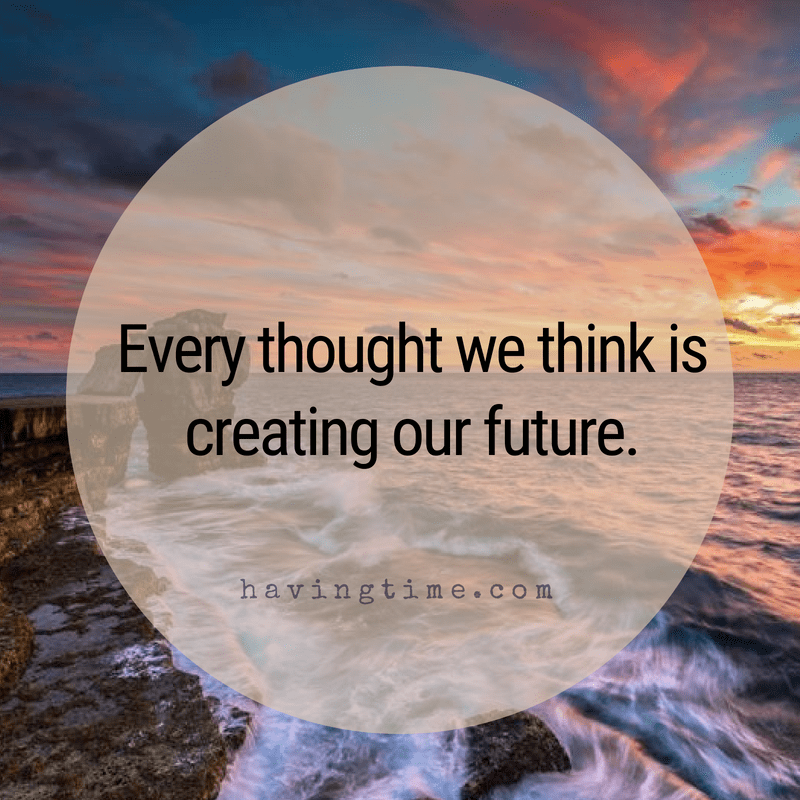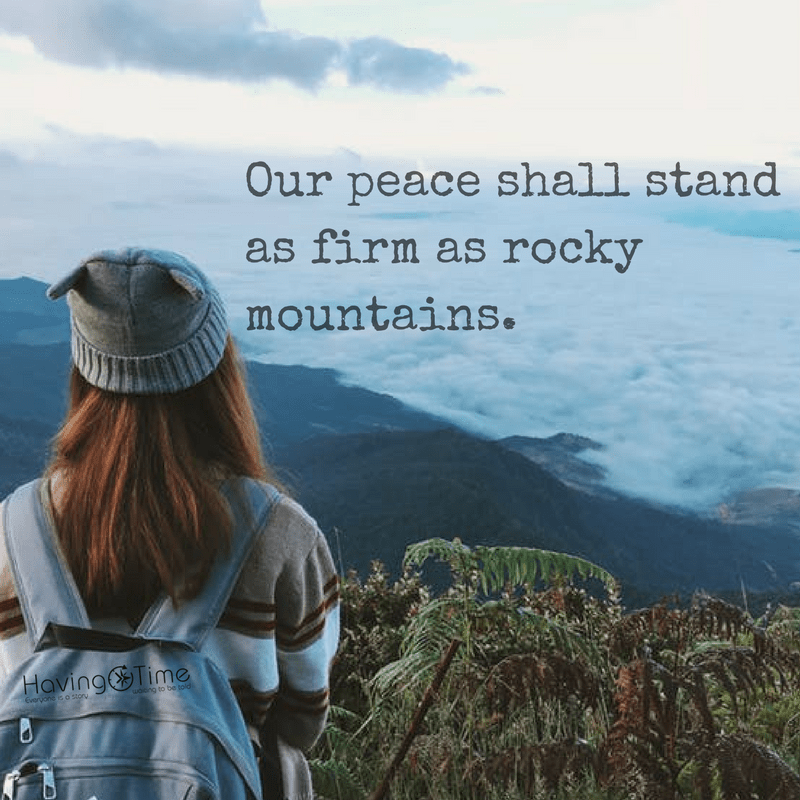Hindsight can bring so much clarity and wisdom to life events. Seen from a broader perspective, events that at the time may have been challenging, emotional or traumatic, we can let go of because we see more clearly how they fit into a bigger picture.

How many times have you been frustrated at something only to realize later that it all worked out perfectly?
But how do we tap into this wisdom now, when hindsight is realized in the future?
I was recently reflecting on an experience I had that inspired me to share this with you.
My partner, Martina, and I were doing some hiking on Vancouver Island. We’d decided the night before to do a hike that took us on a loop through some forests towards the water and back.
I remember as we were about to leave our accommodations Martina decided to tidy it up a little. I was ready to go, and in my mind, I was wondering why she chose to do it now. I suggested that perhaps we can leave it until we get back, but with a single look, it was clear, it was going to be done now! So I might as well either help or wait.
Once we arrived at the trailhead, we took a photo of the trail map and headed on our way. As we walked through the network of trails, we found ourselves held up on a couple of occasions where the trails were not marked. Not marked at all. Having the photo of the map with us was only mildly helpful as it didn’t seem to match the actual trail system accurately, so it took us a couple of minutes to work out where we were, but then we were back on our way again.
After about an hour we ultimately found our way and emerged out of the forest onto the rocky shoreline. We walked out onto the rocks overlooking the ocean, and within about two minutes a group of 3 three orcas (killer whales) swam by. Neither of us had ever seen an orca in real life before, so it felt exceptional. Of course, we’d seen them on TV, but seeing them in their natural habitat right in front of us was something else.
Within another minute or two they were gone.
As we continued our hike, I reflected with a sense of wonder on the small window of time that we’d had to witness these beautiful creatures. Had we been there a few minutes earlier we would have moved on and not seen them. Had we been there a few minutes later and we would have also missed them.
I thought back at all the things that facilitated our “good timing”; the few minutes here and there of confusion in finding our way along the trails, a short conversation with another couple going in the other direction, and yes, Martina tidying up our accommodations. If none of those happened, we would have missed seeing the orcas.

I’ve always had a sense of wonder when things like this happen. We can so quickly judge things as good, bad or insignificant when we don’t have the context of the bigger picture, but the moment we grasp this bigger picture, suddenly any label of good or bad doesn’t have as much meaning, everything has its place.
Context and the bigger picture
Context is so important in our understanding of anything. If you’re in a relationship and your boyfriend or girlfriend, husband or wife suddenly breaks up with you; it’s safe to assume you’d be emotional and hurt. When it happens, you might say it was a bad experience, but what if a few months later you discover they were cheating on you? Was it still a bad experience? A year later you meet someone who you feel more connected to and share a deeper level of intimacy and love than you’ve ever experienced before. You might now say that your ex breaking up with you was a blessing. Your break up is now seen in a broader context.
When something happens in our life, can we truly judge or label it as good or bad when we can’t see how it fits into the bigger picture of our life?
Being present in the Moment
As I continued reflecting on all the things that led to our killer whale experience what also became clear was that I’d not been very present or mindful. Meaning my mind was elsewhere.
When Martina was tidying up, instead of trying to work out why she was choosing that specific time to do it while thinking that we should be leaving, I could have just taken time to appreciate how beautifully she creates a space. She’s always done this, and I’ve always appreciated how she has a natural gift for making the place we’re in special, even if it’s only for a couple of days. I could have simply joined her and enjoyed the process of creating the space, as I’ve done on many occasions, but in this case my mind was not in the present moment, it was thinking about hiking and that we should be on our way.
This was a lesson for me that reinforced the importance of living mindfully while not being too attached to a specific outcome. Seeing the events of the morning in a broader context of witnessing the killer whales, it was clear to me that any thoughts or expectations I had only served to disconnect me from the moment and from Martina.

We may not be able to see where events fit into the bigger picture until later, and it may be hours, days, weeks, months or even years before we realize the significance of certain events in our life, but we can choose to be present in the moment and live mindfully.
Why do we need to be more mindful?
By default, our mind is active. Thoughts, emotions, and stories flow non-stop through our mind creating stress, anxiety, depression, high blood pressure and a whole list of health-related issues, while also disconnecting us from family and friends. If we do nothing to change it, then nothing changes, and the stories of our lives continue to replay themselves over and over.
Our mind can justify very well why we feel a certain way, whether it’s stress, anger or disappointment, but justifying something doesn’t make us happy, it just reinforces the emotion.
The depth or our happiness is not based on the thoughts in our head; it’s the opposite. The quieter our mind, the more happiness naturally emerges. Like it was always there, but our mind was too busy to notice it.
So, the purpose of living mindfully is to quieten our mind.
The wisdom of hindsight
How does the wisdom of hindsight help us now when realizations of hindsight won’t be accessible until the future?
When we have moments of reflection from hindsight it becomes clear that things are not always as they seem. We have a limited perspective at the time when things happen, which leads us to label or judge our experiences as good or bad but seen from hindsight it’s very different.
For me, I’ve found resting on the philosophy that “Things are not always as they seem” allows me to let go of concerns that might otherwise bother me. If I find myself reacting or getting frustrated because something happened, remembering that things are not always as they seem shifts my state of mind, and I can drop the reaction.
But sometimes it’s even more than letting go, letting go infers there’s something to let go of, so when I take this approach it’s difficult to become frustrated in the first place, and instead continue living mindfully.
If mindfulness is quietening our mind by being present in the moment, then this attitude of “Things are not always as they seem” is a compliment to help us make mindfulness work.
How to integrate this into your life?
To make it work, this needs to be more than an idea. The idea of it is nice, but how do we get to the point where it can make a difference in our life?
My words won’t be enough. Knowing it intellectually won’t be enough. There needs to be some level of personal realization. This is where is becomes part of our sense of being and approach to life.
You’ve already had many years of life experiences to draw on, so you’re going to use that.
Become more reflective about life
Recall as many synchronistic events from your life as you can remember. Perhaps it was a small window of time where you met your significant other, maybe a job offer by being in the right place at the right time or witnessing a unique event of nature.
Then start to recall the events that led to it. It might be a major event like some kind of accident, or it might be seemingly insignificant, like forgetting your keys and having to return home for them. Whatever they are, just see them from the broader perspective and how without them happening the way they did, things wouldn’t have worked out the way they did.
Don’t just think in terms of days or weeks, think big picture, months and years.
The more you do this the more you will realize for yourself that things are not always as they seem. It’s this inner realization that will help you let go of stress and dissatisfaction and live mindfully.
When you find yourself upset or stressed at a situation that didn’t happen the way you wanted it to, remember that you’ve already experiencedthings are not as the seem so many times in your life, and this time will be no different.
Is it going to be easy? Not always. Changing our habitual patterns of behavior is a challenge.
Will you find yourself still emotional and caught in dramas? At times perhaps.
One of my teachers used to say; “it’s not that we can’t do something, it’s that we don’t remember to do it.” The power is in your hands, you just have to remember to use it!
Be curiosity. Become fascinated by the mystery of life.

